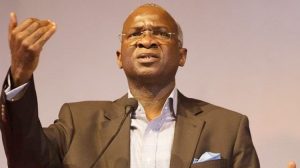By Adagbo Onoja
There are Nigerians who must go beyond whether President Tinubu is a good or a bad phenomenon, Nigerians who must be more concerned with managing the phenomenon in such a way that it is productive for Nigeria. Of course, Nigeria confronts a phenomenon by name Ahmed Bola Tinubu who is already the country’s sitting president today. There is not any other name by which to call anyone who crushed all the hurdles Tinubu crossed to climb power. The first way of going beyond the good or bad ontology has been hugely successful. The post-election anger did not degenerate into anything violent. Going by the records in quite a number of African countries, that is not a mean achievement but another of Nigeria’s uniqueness. Right now, the tussle for power has shifted to the courts. An air of great expectations is hanging, regarding the outcome of the judicial tussle. The Nigerian judiciary could also set a continental record in interpretivist jurisprudence.

Hey, which ‘big boy’ in the inner circle wrote that inauguration speech for the president?
However, courts do not reconcile conflict parties. Courts can only declare the winner and the loser which could be the source of another cycle of bitterness and recriminations. It is statesmen who reconcile because they operate at a higher level of contemplation of consequences. Statesmen are not necessarily more intelligent than other citizens but they have seen a lot about the state and can or do operate in terms of safeguarding the state unlike politicians who want nothing more than to be in power. Even at the best of time, what can the most determined statesmen do if the subsidy decision, for example, hands a viable weapon for anarchy to its victims, genuine and emergency opponents of the regime? That will annul the violent turn many Nigerians have been working hard to keep in check.
The foregoing is one way of looking at the subsidy decision of the government of the day. The second point about it must be this. It bears repeating that the past two decades have been very traumatic for vast majority of Nigerians. It was thought that President Tinubu’s inauguration speech would make a powerful statement on collective trauma. Sadly, there was not that distinctive pronouncements to that effect. Meanwhile, the Nigerian State is at its lowest level of legitimacy since Independence. The traumatic experiences in the hands of bandits, the arbitrariness of power, the exclusionary practices of power and the degree of looting in government explains the delegitimization.
Closely tied to that is the reality of anger from below in Nigeria. It has always been there. The difference today is that the youngsters in the ‘Ali-Must-Go or Ango-Must-Go crises were trained in the ideology and tactics of popular struggle. The youngsters today lack the benefit of that advantage following the collapse of the universities. So, a test of strength with the youngsters today is what any government must avoid. It could take many turns, the human rights implications of containing some of which turns could be so completely unacceptable, both at home and abroad. Thinking that the angry ones should know that there are lofty plans is not the way up to go because it reeks Stalinism to expect people who are already down to know that you are taking them to Heaven one day.

President Tinubu and his initial appointees – Senator Akume and Hon Gbajabiamila, FG Scribe and Chief of Staff, respectively
There is a third way. Even if it is possible that the president has reached a compromise with the layer of speculators feeding fat on subsidy and who have, hitherto, fought any attempt to remove it, Dangote’s entry into the oil business is a completely different dimension to the supply of fuel. Given the domestic oil supply crisis in Nigeria, it is unlikely that Dangote’s factory is going to follow its export oriented character strictly. There is unlikely to be any miracle which will stop any government in power from seeking the intervention of the Dangote facilities in domestic oil supply process. Has everything been worked out that this is not going to be another layer of conflict between the resurgent or residual subsidy lobby in the oil industry and the productive capitalism that Dangote represents? It could be okay for such conflicts to occur because conflicts are almost always productive. But will they be such that the portion of Nigerians who have no voice in these matters will not be the ones at the collateral end of it?
There is the fourth point. How could a decision on a privileged commodity such as oil that affects every other thing be taken at a time that the sitting president does not have an elite constituency to fall back on in terms of crisis management. It is trite now to say that the power elite is fragmented in a way that has never been the case. Obasanjo doesn’t talk to Buhari and neither IBB. General Danjuma is perhaps too angry over certain developments that have taken place. It is certain that General Gusau and Buhari still have nothing to do with each other. And the fragmentation goes down all the way. Elite members fight each other or disagree but they come together when national security is threatened. In the case of the current disagreement, there is no coming back because the dramatis personae are getting too old to play active roles and partly because the disagreements are deep. So, chances of reconciliation looks zero. It is something to worry about irrespective of whether one likes any or all of them or not. It is not about their individual selves but about the survival of a system in which they have been the most privileged actors. The assumption that Buhari’s successor will offer a new pole of attraction around which the elite can converge and, through that, begin the big challenge of making the state more legitimate again is itself being complicated the more by the first key decision of the government on Day One. It is because each of the big players is a patron of a different presidential candidate in the February race. Although all the leading candidates in that race promised removing fuel subsidy, they are all facing a different reality today.
And that brings us to the fifth and last point to be made. It is the MetaTinubu crisis that the decision reveals. MetaTinubu would mean the Tinubu epistemology of Tinubu politics, the mainstay of which is the facility of an inner core of heady ideologues who take a ‘disinterested’ look at major moves a Tinubu makes so that potential weaknesses of such a move may not only be anticipated but the dangers also argued. This is more so that the Tinubu in question is presiding over the entire Nigeria and the decisions he takes has implications for very, very vulnerable people in society. That well-known feature of Asiwaju Tinubu politics which privileges the practice of simulation obviously did not feature ahead of this decision taken at the time it was taken. The situation around the president suggests that there are no ‘big boys in the room’ to say, “Sir, this is not your inaugural speech to Nigeria in the current situation”. It is not disturbing just because labour threatens to shut down the country but because the larger implications have clearly not been factored in. One of it must be the number of human beings trekking on the Airport Road, for example, in the days following the announcement. From the image angle alone, that is an irreparable damage. Simulation has been one of the most unfailing technologies of power in the hands of all variants of leaders in modern times. President Tinubu could not have fought his way into power only to end up toying with an opportunity to make history.
There appeared a strong hint that the president appreciates this. The hint came from the first major outing of Oluremi Tinubu’s outing at a Church session on May 28th, 2023. That her outing was trending show the significance which did not lie in the words she used as such but in the first family’s awareness of what people are thinking. It suggested that the president, through the First Lady, would have a way of knowing and filtering popular sentiments and respond to them in policy terms. But only for the subsidy decision to not only annul the brilliance of the First Lady’s ‘sermon’ but, above all, challenge any hope that President Tinubu will, per force, find himself trying to replicate Chief Awo’s Unity Party of Nigeria (UPN) along the lines that Claude Ake spelt out. Ake said the UPN understood the value of defensive radicalism and, as such, would manage capitalism so efficiently as to run the socialists out of town. In other words, the system would be so efficiently run that a case for an alternative would look pointless. It is possible Ake was exaggerating but the capability he was attributing to the old UPN was not beyond it. President Tinubu may not be an ideologue of Awoism. He doesn’t have to be but, to the extent that he is a believer in capitalism, efficient management of capitalism is automatically the best he can ever hope to achieve.
The author, an editorial Associate of Intervention, wrote in from the School of International Relations @ the University of St Andrews, UK




























